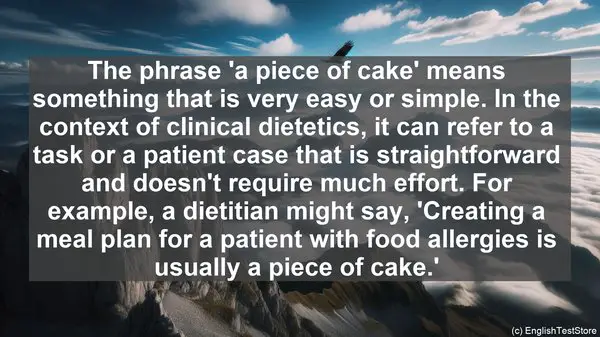1. A Piece of Cake
The phrase ‘a piece of cake’ means something that is very easy or simple. In the context of clinical dietetics, it can refer to a task or a patient case that is straightforward and doesn’t require much effort. For example, a dietitian might say, ‘Creating a meal plan for a patient with food allergies is usually a piece of cake.’
2. The Apple of One’s Eye
When someone is referred to as the ‘apple of one’s eye,’ it means they are cherished or highly valued. In clinical dietetics, this idiom can be used to describe a patient who is particularly important or receives special attention. For instance, a dietitian might say, ‘Mrs. Smith, who has been with us for years, is the apple of our eye.’

3. A Picture is Worth a Thousand Words
This idiom emphasizes the power of visual representation. In the field of clinical dietetics, it highlights the significance of using visual aids like charts, diagrams, or images to convey complex information to patients. For example, a dietitian might say, ‘When explaining portion sizes, a picture is worth a thousand words.’
4. To Have a Sweet Tooth
Having a ‘sweet tooth’ means having a strong liking or craving for sweet foods. In the context of clinical dietetics, it can be used to describe a patient who often indulges in sugary treats. For instance, a dietitian might say, ‘John has a sweet tooth, so we need to find healthier alternatives for his dessert choices.’

5. To Be in a Pickle
When someone is ‘in a pickle,’ it means they are in a difficult or challenging situation. In clinical dietetics, this idiom can be used to describe a patient who is facing multiple dietary restrictions or complications. For example, a dietitian might say, ‘Samantha is in a pickle with her diet. She has diabetes, celiac disease, and lactose intolerance.’
6. To Spill the Beans
The phrase ‘to spill the beans’ means to reveal a secret or confidential information. In clinical dietetics, it can be used humorously to describe a patient who unintentionally discloses their dietary indiscretions. For instance, a dietitian might say, ‘During our session, John spilled the beans about his late-night snacking.’
7. To Go Bananas
When someone ‘goes bananas,’ it means they become extremely excited, agitated, or irrational. In clinical dietetics, this idiom can be used to describe a patient who becomes overly enthusiastic or obsessive about a particular diet trend. For example, a dietitian might say, ‘Lately, many people are going bananas over the keto diet.’
8. To Have a Gut Feeling
Having a ‘gut feeling’ means having an intuitive or instinctive sense about something. In clinical dietetics, it can be used to describe a dietitian’s hunch or suspicion about a patient’s dietary habits. For instance, a dietitian might say, ‘I have a gut feeling that Sarah isn’t following the prescribed meal plan.’
9. To Be a Couch Potato
When someone is referred to as a ‘couch potato,’ it means they are lazy or inactive, often spending long hours sitting or lying down. In clinical dietetics, this idiom can be used to describe a patient who leads a sedentary lifestyle. For example, a dietitian might say, ‘To improve your health, you need to be less of a couch potato.’
10. To Be on Thin Ice
When someone is ‘on thin ice,’ it means they are in a risky or precarious situation, where any wrong move can have serious consequences. In clinical dietetics, this idiom can be used to describe a patient who is not following the recommended dietary guidelines. For instance, a dietitian might say, ‘If John continues to ignore his diet, he’ll be on thin ice with his health.’
